| Listing 1 - 10 of 16 | << page >> |
Sort by
|
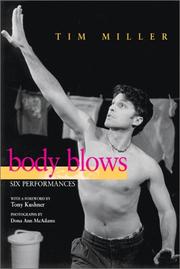
ISBN: 1282269046 9786612269042 0299176835 9780299176839 0299176800 0299176843 9780299176808 9780299176846 0739425994 9780739425992 0299176894 Year: 2002 Publisher: Madison : University of Wisconsin Press,
Abstract | Keywords | Export | Availability | Bookmark
 Loading...
Loading...Choose an application
- Reference Manager
- EndNote
- RefWorks (Direct export to RefWorks)
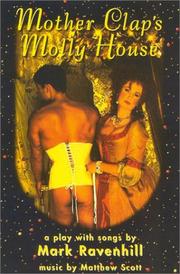
ISBN: 0413769305 9780413769305 Year: 2002 Publisher: London : Methuen drama,
Abstract | Keywords | Export | Availability | Bookmark
 Loading...
Loading...Choose an application
- Reference Manager
- EndNote
- RefWorks (Direct export to RefWorks)
Gay men --- Prostitution --- London (England)
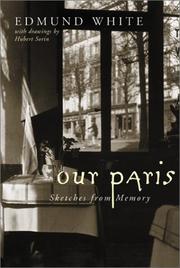
ISBN: 0060085924 Year: 2002 Publisher: New York (N.Y.) : Ecco,
Abstract | Keywords | Export | Availability | Bookmark
 Loading...
Loading...Choose an application
- Reference Manager
- EndNote
- RefWorks (Direct export to RefWorks)
AIDS (Disease) --- Americans --- Gay men --- History
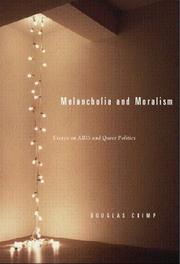
ISBN: 0262032953 Year: 2002 Publisher: Cambridge (Mass.) : MIT press,
Abstract | Keywords | Export | Availability | Bookmark
 Loading...
Loading...Choose an application
- Reference Manager
- EndNote
- RefWorks (Direct export to RefWorks)
AIDS( Disease) --- Gay men. --- Political aspects.

ISBN: 1560231912 Year: 2002 Publisher: New York (N.Y.) : Harrington park press,
Abstract | Keywords | Export | Availability | Bookmark
 Loading...
Loading...Choose an application
- Reference Manager
- EndNote
- RefWorks (Direct export to RefWorks)
Gay men --- Male friendship. --- Male prostitution. --- Sex instruction for gay men. --- Sexual behavior.
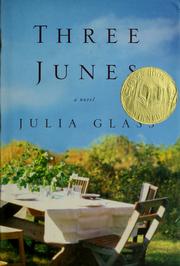
ISBN: 0375421440 0385721420 0375422412 Year: 2002 Publisher: New York : Pantheon Books,
Abstract | Keywords | Export | Availability | Bookmark
 Loading...
Loading...Choose an application
- Reference Manager
- EndNote
- RefWorks (Direct export to RefWorks)
Fathers and sons --- Gay men --- Scots --- Long Island (N.Y.) --- Scotland
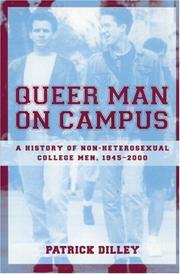
ISBN: 0415933374 1317973003 1315870541 1317973011 9781317973003 0415933366 9780415933360 9780415933377 9781315870540 9781317972990 9781317973010 Year: 2002 Publisher: New York : RoutledgeFalmer,
Abstract | Keywords | Export | Availability | Bookmark
 Loading...
Loading...Choose an application
- Reference Manager
- EndNote
- RefWorks (Direct export to RefWorks)
This book reveals the inadequacy of a unified ""gay"" identity in studying the lives of queer college men. Instead, seven types of identities are discernible in the lives of non-heterosexual college males, as the author shows.
Gay men --- Gay college students --- Identity (Psychology) --- Gays, Male --- Homosexuals, Male --- Male gays --- Male homosexuals --- Urnings --- Gays --- Men --- College students --- Identity. --- Psychology. --- History
Book
ISBN: 290676986X Year: 2002 Publisher: Toulouse : Octares,
Abstract | Keywords | Export | Availability | Bookmark
 Loading...
Loading...Choose an application
- Reference Manager
- EndNote
- RefWorks (Direct export to RefWorks)
Male homosexuality --- Men --- Gay men --- AIDS (Disease) --- Homosexualité masculine --- Hommes --- Homosexuels masculins --- Sida --- Sexual behavior --- Social life and customs. --- Prevention --- Sexualité --- Moeurs et coutumes --- Prévention
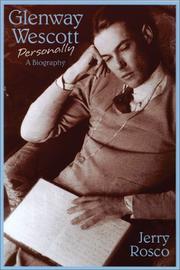
ISBN: 128278823X 9786612788239 0299177335 9780299177331 9781282788237 0299177343 9780299177348 0299177300 9780299177300 6612788232 Year: 2002 Publisher: Madison University of Wisconsin Press
Abstract | Keywords | Export | Availability | Bookmark
 Loading...
Loading...Choose an application
- Reference Manager
- EndNote
- RefWorks (Direct export to RefWorks)
As a writer, Glenway Wescott (1901-1987) left behind several novels, including The Grandmothers and The Pilgrim Hawk, noted for their remarkable lyricism. As a literary figure, Wescott also became a symbol of his times. Born on a Wisconsin farm in 1901, he associated as a young writer with Hemingway, Stein, and Fitzgerald in 1920s Paris and subsequently was a central figure in New York's artistic and gay communities. Though he couldn't finish a novel after the age of forty-five, he was just as famous as an arts impresario, as a diarist, and for the company he kept: W. H. Auden, Christopher Isherwood, Marianne Moore, Somerset Maugham, E. M. Forster, Joseph Campbell, and scores of other luminaries. In Glenway Wescott Personally, Jerry Rosco chronicles Wescott's long and colorful life, his early fame and later struggles to write, the uniquely privileged and sometimes tortured world of artistic creation. Rosco sensitively and insightfully reveals Wescott's private life, his long relationship with Museum of Modern Art curator Monroe Wheeler, his work with sex researcher Alfred Kinsey that led to breakthrough findings on homosexuality, and his kinship with such influential artists as Jean Cocteau, George Platt-Lynes, and Paul Cadmus.
Gay men --- Americans --- Authors, American --- History --- Wescott, Glenway, --- Wisconsin --- Paris (France) --- New York (N.Y.) --- Intellectual life --- Authors [American ] --- 20th century --- Biography --- United States --- Wescott, Glenway, - 1901 --- -Americans - France - Paris - History - 20th century. --- Wisconsin - Biography.
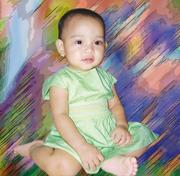
ISBN: 113450635X 1280069023 020316704X 9780203167045 9780415261807 0415261805 9786610069026 6610069026 9780203282397 0203282396 0415261805 9781134506309 9781134506347 9781134506354 1134506341 Year: 2002 Publisher: London Routledge, Taylor & Francis Group
Abstract | Keywords | Export | Availability | Bookmark
 Loading...
Loading...Choose an application
- Reference Manager
- EndNote
- RefWorks (Direct export to RefWorks)
Polari is a secret form of language mainly used by homosexual men in London and other cities during the twentieth century. Derived in part from the slang lexicons of numerous stigmatised and itinerant groups, Polari was also a means of socialising, acting out camp performances and reconstructing a shared gay identity and worldview among its speakers. This book examines the ways in which Polari was used in order to construct 'gay identities', linking its evolution to the changing status of gay men and lesbians in the UK over the past fifty years.
Polari. --- Gay men --- English language --- Germanic languages --- Gays, Male --- Homosexuals, Male --- Male gays --- Male homosexuals --- Urnings --- Gays --- Men --- Languages, Secret --- Language. --- Slang. --- Slang --- Language --- Great Britain --- Gay slang. --- Dialectology
| Listing 1 - 10 of 16 | << page >> |
Sort by
|

 Search
Search Feedback
Feedback About UniCat
About UniCat  Help
Help News
News